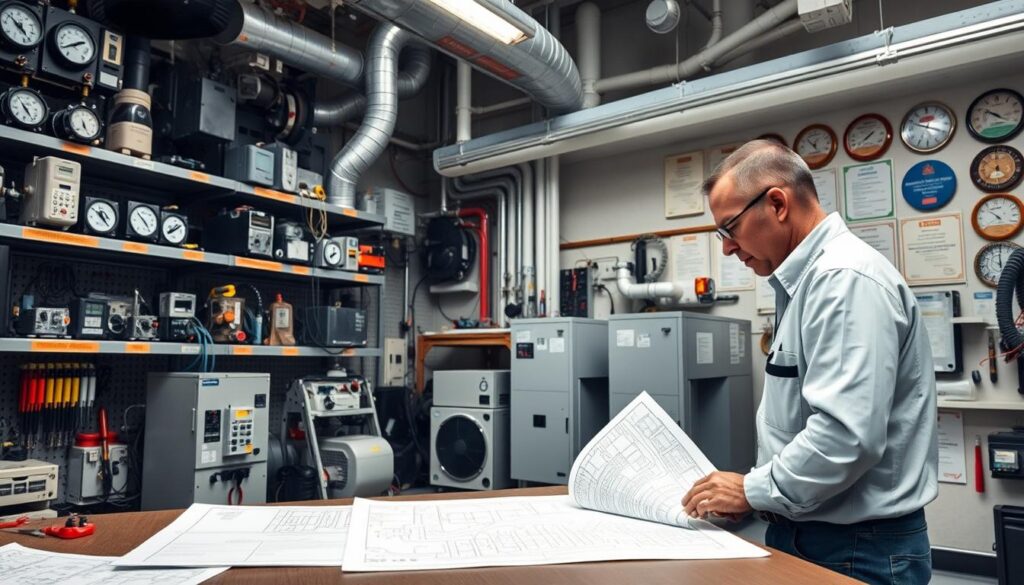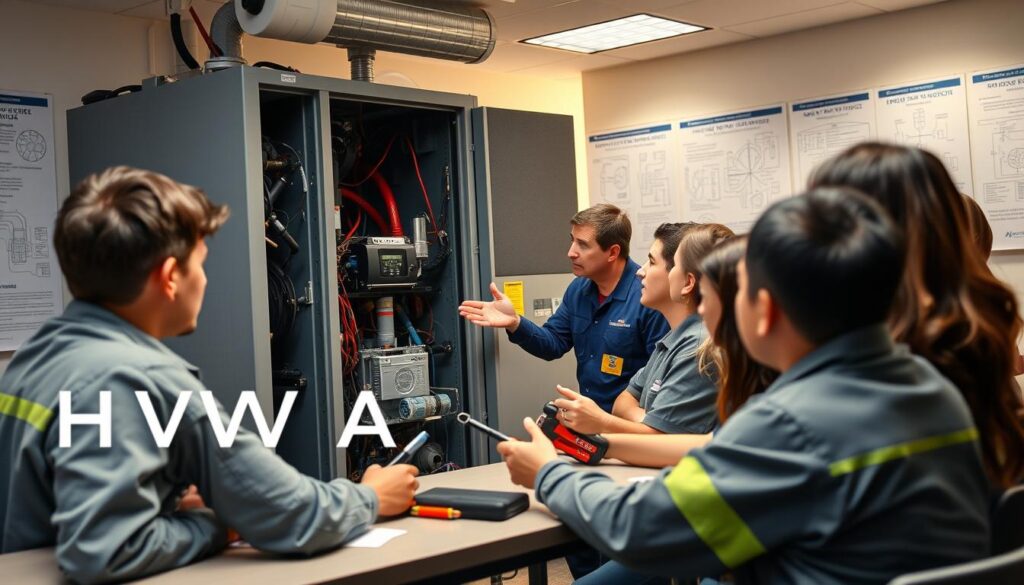Affiliate Disclosure
HVAC Guide Guys is a participant in the Amazon Services LLC Associates Program, an affiliate advertising program designed to provide a means for sites to earn advertising fees by advertising and linking to Amazon.
How Hard Is HVAC Training? Are you ready to turn your technical skills into a rewarding career? What if learning HVAC training could open doors to many professional chances?
The HVAC industry is a thrilling path for those looking for a technical career. With over 650,000 workers in the U.S. and a 5% annual growth, knowing about HVAC training is key for new technicians.

Getting into HVAC requires hard work, technical skills, and a desire to learn complex systems. You’ll learn practical skills, understand mechanical parts, and face hands-on training. This will test your physical and mental strength.
Key Takeaways
- HVAC training offers great career chances with salaries from $49,500 to $100,000
- Training usually takes 1-2 years
- Knowing math and physics is vital
- The industry has strong job growth and many opportunities
- Being physically fit and solving problems are key to success
Table of Contents
Understanding the HVAC Technician Career Path
Starting a career as an HVAC technician is exciting. You’ll learn important skills in training programs. These skills are key for success in this field.
Core Responsibilities of HVAC Technicians
HVAC technicians keep places comfortable and safe. Your work will include:
- Reading complex technical blueprints
- Diagnosing system malfunctions
- Installing and repairing heating and cooling systems
- Testing electrical circuits and components
- Performing precision welding on pipe systems
- Conducting thorough leak detection
Industry Growth and Job Outlook
The HVAC industry is growing fast. With a 9% job growth rate from 2023 to 2033, you’ll find many chances to grow your career.
| Employment Metric | 2023 Statistics |
|---|---|
| Total HVAC Jobs | 441,200 |
| Projected Job Growth | 9% (2023-2033) |
| Estimated New Jobs | 40,100 |
Salary and Career Advancement
Your salary in this field is good. HVAC technicians earn a median of $57,300 a year. The best can make over $82,630.
“Continuous learning and adaptability are key to success in the HVAC industry.” – Industry Expert
To move up, focus on new technologies and energy-saving systems. This will help you grow in your career.
Basic Educational Requirements for HVAC Training
Starting your HVAC journey begins with basic education. A high school diploma or GED is the first step. Most employers and training programs require this for HVAC technicians.
High school courses can prepare you well for HVAC. Key subjects include:
- Computer science
- Physics
- Mathematics
- Shop classes
These subjects build skills useful for HVAC. Vocational programs value students with technical experience.
“The right educational foundation can make your HVAC career path smoother and more successful.” – HVAC Training Expert
Learning isn’t just in the classroom. High school technical classes offer a big advantage. They prepare you for HVAC training.
| Educational Requirement | Details |
|---|---|
| Minimum Education | High School Diploma or GED |
| Recommended High School Courses | Physics, Mathematics, Computer Science |
| Additional Benefit | Vocational/Shop Class Experience |
A high school diploma is key, but your passion matters most. Take every learning chance you get.
Explore Our HVAC Shop
Looking for top-rated HVAC tools, parts, and accessories? Visit our shop and find the perfect solution for your needs.
Visit the ShopHow Hard Is HVAC Training: Breaking Down the Challenges
Starting HVAC training means facing many challenges. It’s not just about sitting in class. You’ll need to learn a lot of skills.
Understanding HVAC training’s difficulty involves looking at several key areas. These areas test your technical skills, physical strength, and ability to manage your time well.
Physical Demands of Training
HVAC training is tough. It requires a lot of physical effort:
- Lifting heavy equipment weighing up to 70 pounds
- Working in tight spaces and hard environments
- Doing tasks in very hot or cold temperatures
Studies show that 65% of HVAC technicians say being physically fit is key to doing well in this job.
Technical Knowledge Requirements
The technical side of HVAC training can be overwhelming. You’ll have to learn:
- How electrical systems work
- Refrigeration basics
- Advanced ways to diagnose problems
- How to solve complex issues
But, 70% of HVAC students say the technical stuff gets easier with good guidance.
Time Management Challenges
Managing your time is critical. You’ll need to balance school, hands-on training, and personal life. HVAC programs usually require:
| Training Component | Time Commitment |
|---|---|
| Classroom Instruction | 20-25 hours per week |
| Practical Training | 15-20 hours per week |
| Self-Study | 10-15 hours per week |
“Success in HVAC training is about dedication, adaptability, and a willingness to continuously learn.” – HVAC Industry Expert
With the right mindset and effort, you can overcome HVAC training’s challenges. This will lead to a fulfilling career in this exciting field.
Two Main Paths to Becoming an HVAC Technician
When you look into hvac technician training, you’ll find two main ways to start your career. You can choose on-the-job training or formal educational programs. Each path has its own benefits and challenges for those wanting to be HVAC pros.
One way is to get a job and learn on the job. This lets you get real-world experience and learn from experts. On-the-job training usually lasts 1 to 2 years. It mixes work experience with classroom learning.
“Experience is the best teacher in the HVAC industry,” says a veteran technician.
The other path is through formal hvac apprenticeship programs. These programs help you learn everything you need to know. They include:
- Structured classroom instruction
- Hands-on technical training
- Supervised externship opportunities
- Preparation for industry certifications
The Bureau of Labor Statistics says the HVAC industry will grow by 5% from 2021 to 2031. This makes both training paths great for your career. Vocational schools offer programs from 6 to 9 months, so you can start working fast.
Choosing depends on what you prefer to learn, how much time you have, and your career goals. Formal programs give you a set learning plan. On-the-job training gives you practical experience right away.
Explore Our HVAC Shop
Looking for top-rated HVAC tools, parts, and accessories? Visit our shop and find the perfect solution for your needs.
Visit the ShopHVAC Certificate Programs: Duration and Curriculum
HVAC certificate programs offer a fast track to a technical career. They provide students with the skills needed to succeed in the HVAC field. This includes heating, ventilation, and air conditioning.
Certificate programs last from 6 to 12 months. They are designed to quickly prepare students for the HVAC industry. Students learn both theory and practical skills.
Core Course Components
The core curriculum covers important technical areas:
- Electrical systems and circuit analysis
- Refrigeration principles
- Advanced climate control technologies
- HVAC system design and installation
- Diagnostic and troubleshooting techniques
Hands-on Training Elements
Practical training is key in HVAC education. Students practice in real-world scenarios:
- Laboratory equipment manipulation
- Tool usage and maintenance
- System installation practice
- Repair and maintenance simulations
Testing and Assessment Methods
Students are tested to ensure they have the necessary skills through:
- Written examinations testing theoretical knowledge
- Practical skills assessments
- Performance-based certification tests
“The key to success in HVAC is combining technical knowledge with hands-on experience.” – Industry Expert
Essential Skills and Technical Knowledge Required

Mastering HVAC coursework intensity requires a wide range of technical skills. These skills go beyond just basic mechanical knowledge. Your success in the HVAC field depends on gaining specialized knowledge and practical skills in many key areas.
“Technical proficiency is the cornerstone of an exceptional HVAC technician’s career.” – Industry Expert
The core technical skills you’ll need to develop include:
- Blueprint reading and interpretation
- Electrical system understanding
- Advanced tool proficiency
- Safety protocol compliance
- Problem-solving capabilities
Developing these skills takes a lot of training and hands-on experience. HVAC technicians need to be experts in many areas. This includes understanding complex electrical circuits and doing precise mechanical installations.
| Skill Category | Required Proficiencies | Importance Level |
|---|---|---|
| Electrical Knowledge | Circuit analysis, voltage understanding | High |
| Tool Management | Multimeter usage, specialized equipment handling | Critical |
| Safety Protocols | OSHA compliance, refrigerant handling | Essential |
Building these skills takes a lot of effort and a commitment to learning. The HVAC industry is always changing. Technicians need to keep up with new technologies and practices.
Your ability to use technical knowledge in real-world situations will set you apart. Focus on building a strong skill set. This should include both theoretical knowledge and practical experience.
Explore Our HVAC Shop
Looking for top-rated HVAC tools, parts, and accessories? Visit our shop and find the perfect solution for your needs.
Visit the ShopCertification and Licensing Requirements
Understanding HVAC certification requirements is key to your career. Professional licensing shows you can do HVAC work safely and well.
EPA Section 608 Certification Essentials
The Environmental Protection Agency (EPA) requires certification for refrigerant handling. This is a must-have for HVAC technicians. There are four types of certifications:
- Type I: Small appliances
- Type II: High-pressure appliances
- Type III: Low-pressure appliances
- Universal: Covers all refrigerant types
State-Specific Licensing Considerations
When preparing for your hvac licensing exam, check your state’s rules. Licensing laws differ from state to state.
| State Category | Licensing Requirements | Exam Complexity |
|---|---|---|
| States with Strict Regulations | Written exam + work experience | High |
| States with Minimal Requirements | Basic certification | Low |
| No Statewide Licensing | Local jurisdiction regulations | Variable |
Professional Certification Opportunities
Consider extra certifications to boost your career:
- North American Technical Excellence (NATE) Certification
- HVAC Excellence Professional Certification
- OSHA Safety Certification
“Continuous learning and certification are the keys to success in the HVAC industry.” – HVAC Professional Magazine
The cost of certification is $50 to $300, based on your state and needs. Investing in your growth opens up more career paths.
HVAC Apprenticeship Programs: What to Expect

HVAC apprenticeship programs are a great way to learn hands-on skills and earn good money. They last from three to five years. You’ll get classroom lessons and real-world training.
The level of difficulty in HVAC apprenticeships varies. But, most programs have a clear path to becoming a pro. You’ll start as a junior, learning from experienced technicians.
“An apprenticeship is your ticket to mastering the HVAC trade with real-world expertise.”
Here are some key things about HVAC apprenticeships:
- Paid training opportunities
- Gradual wage progression
- Comprehensive skill development
- Direct industry experience
Wages increase as you gain experience:
| Experience Level | Hourly Wage |
|---|---|
| Starting Wage | $15.00 |
| After 6 Months | $20.51 |
| After 1 Year | $24.74 |
| Journeyman Level | Up to $42.35 |
Pro tip: Many local HVAC companies prefer hiring apprentices who demonstrate strong interpersonal skills and a genuine passion for learning.
Most programs have a trial period of 30-45 days. After that, you might join a union and get more benefits. With hard work and learning, you could make over $100,000 in five years.
Explore Our HVAC Shop
Looking for top-rated HVAC tools, parts, and accessories? Visit our shop and find the perfect solution for your needs.
Visit the ShopCommon Challenges in HVAC Training Programs
Starting your HVAC career training journey comes with its own set of challenges. These challenges can test your determination and skills. Knowing about these obstacles helps you prepare better for your education.
HVAC career training goes beyond just classroom learning. It requires a big time commitment and careful planning from you.
- Technical Complexity: Learning about complex system designs and electrical components
- Physical Demands: Working with heavy equipment and in tough environments
- Continuous Learning: Keeping up with new technologies
Students often face these main challenges:
- Technical Knowledge Acquisition: Mastering complex electrical systems and refrigeration technologies
- Practical Skill Development: Turning theory into practical skills
- Time Management: Balancing school, training, and personal life
“Success in HVAC training requires persistence, adaptability, and a commitment to continuous learning.” – Industry Expert
Certificate programs in HVAC last about 10 months. The HVAC market is expected to hit $208 billion by 2025. Overcoming these challenges is key to your success. Your ability to face these obstacles will shape your future in this fast-growing industry.
Career Opportunities After HVAC Training
After finishing your HVAC training, a world of exciting career opportunities opens up. The HVAC industry has many paths for skilled technicians. These paths offer promising jobs and chances for growth.
In 2023, the HVAC job market is very promising. There are 441,200 technician jobs across the country. The job market is expected to grow by 9% by 2033. Your hard work in HVAC training will lead to great professional opportunities.
Entry-Level Positions
New HVAC graduates can find many entry-level jobs in different sectors:
- Residential HVAC Technician
- Commercial Systems Installer
- Service and Maintenance Technician
- Junior Climate Control Specialist
Advancement Opportunities
Your career can grow fast with experience and more certifications. Here are some possible career paths:
- Senior Technician
- HVAC Project Manager
- Technical Sales Representative
- Operations Supervisor
Specialization Options
| Specialization | Average Annual Salary | Key Skills Required |
|---|---|---|
| Commercial HVAC Systems | $65,000 | Complex System Design |
| Industrial Refrigeration | $70,000 | Advanced Technical Knowledge |
| Green Energy Systems | $62,000 | Sustainable Technology Expertise |
“Your HVAC training is the foundation for a dynamic and rewarding career with endless possibilities.” – HVAC Industry Expert
HVAC technicians earn a median salary of $57,300. Top earners make even more. Strategic specialization and continuous learning can increase your salary and job satisfaction.
Conclusion
Starting HVAC technician training is a smart career choice. The field is expected to grow 13% in the next decade. Learning and growing in this field can open up many opportunities.
The effort you put into HVAC training will pay off. You could see your salary go up by 15-20% with advanced certifications. This shows that the hard work is worth it.
To become an HVAC pro, you need to be dedicated and plan well. Getting certifications like EPA 608 and NATE can really help your career. You could earn around $45,910 or even up to $73,000.
States like California, Ohio, Florida, Texas, and Illinois are great for HVAC jobs. They offer good pay and chances to grow in your career.
Success in HVAC depends on always learning and being ready to adapt. New energy-saving tech and an aging workforce mean more jobs for skilled people. By getting the right training and staying committed, you can overcome any challenges and have a strong career.
Your work in HVAC is not just about fixing things. It’s about making sure places are comfortable and work well. With the right mindset, your HVAC training can lead to a rewarding and stable career.
FAQ
How long does HVAC training typically take?
Is HVAC training physically demanding?
What educational background do I need to start HVAC training?
How difficult is the HVAC certification exam?
What are the costs associated with HVAC training?
How long does HVAC training typically take?
Is HVAC training physically demanding?
What educational background do I need to start HVAC training?
How difficult is the HVAC certification exam?
What are the costs associated with HVAC training?
FAQ
How long does HVAC training typically take?
HVAC training time varies. Certificate programs last 6 months to 2 years. Associate degree programs take about 2 years. Apprenticeships last 3-5 years, mixing classroom and on-the-job training.
Is HVAC training physically demanding?
Yes, HVAC training is tough. You’ll lift heavy, work in tight spots, climb ladders, and use tools. Being fit and having stamina is key.
What educational background do I need to start HVAC training?
You need a high school diploma or GED for HVAC training. Math, physics, and vocational classes help. Some programs want students with mechanical or electrical knowledge.
How difficult is the HVAC certification exam?
The HVAC exam is tough. It tests your technical, safety, and practical skills. The EPA Section 608 Certification is a good example. Good preparation is essential.
What are the costs associated with HVAC training?
HVAC training costs vary. They range from
FAQ
How long does HVAC training typically take?
HVAC training time varies. Certificate programs last 6 months to 2 years. Associate degree programs take about 2 years. Apprenticeships last 3-5 years, mixing classroom and on-the-job training.
Is HVAC training physically demanding?
Yes, HVAC training is tough. You’ll lift heavy, work in tight spots, climb ladders, and use tools. Being fit and having stamina is key.
What educational background do I need to start HVAC training?
You need a high school diploma or GED for HVAC training. Math, physics, and vocational classes help. Some programs want students with mechanical or electrical knowledge.
How difficult is the HVAC certification exam?
The HVAC exam is tough. It tests your technical, safety, and practical skills. The EPA Section 608 Certification is a good example. Good preparation is essential.
What are the costs associated with HVAC training?
HVAC training costs vary. They range from $1,200 to $15,000. Community colleges are cheaper, while technical schools cost more. You’ll also need tools, safety gear, and exam fees.
Can I become an HVAC technician through an apprenticeship?
Yes, apprenticeships are a great option. They last 3-5 years, combining work and classroom learning. Unions and trade groups offer these programs for full training and certification.
What are the most challenging aspects of HVAC training?
HVAC training is hard. You’ll learn complex tech, develop mechanical skills, and understand electrical systems. Keeping up with new tech and balancing study with practice is also tough.
Are there opportunities for specialization in HVAC?
Yes! You can specialize in commercial systems, refrigeration, solar heating, or industrial systems. You can also focus on green energy or smart home systems. Specialized certifications help you become an expert.
What is the job outlook for HVAC technicians?
The job outlook is great. The Bureau of Labor Statistics predicts a 15% growth rate by 2026. Demand for energy-efficient systems and maintenance means lots of job openings.
Do I need continuing education after initial HVAC training?
Yes, you need to keep learning. HVAC tech and rules change often. Many certifications need renewal. Staying updated with new tech and methods keeps you competitive.
,200 to ,000. Community colleges are cheaper, while technical schools cost more. You’ll also need tools, safety gear, and exam fees.
Can I become an HVAC technician through an apprenticeship?
Yes, apprenticeships are a great option. They last 3-5 years, combining work and classroom learning. Unions and trade groups offer these programs for full training and certification.
What are the most challenging aspects of HVAC training?
HVAC training is hard. You’ll learn complex tech, develop mechanical skills, and understand electrical systems. Keeping up with new tech and balancing study with practice is also tough.
Are there opportunities for specialization in HVAC?
Yes! You can specialize in commercial systems, refrigeration, solar heating, or industrial systems. You can also focus on green energy or smart home systems. Specialized certifications help you become an expert.
What is the job outlook for HVAC technicians?
The job outlook is great. The Bureau of Labor Statistics predicts a 15% growth rate by 2026. Demand for energy-efficient systems and maintenance means lots of job openings.
Do I need continuing education after initial HVAC training?
Yes, you need to keep learning. HVAC tech and rules change often. Many certifications need renewal. Staying updated with new tech and methods keeps you competitive.

